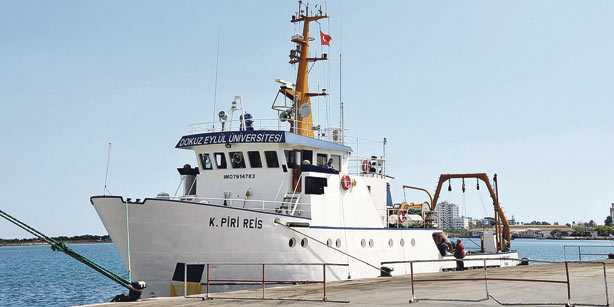A draft version of the annual EU Progress Report on Turkey speaks favorably of Turkey’s continuous support for negotiations between the Turkish and Greek communities of Cyprus, but a final version expected on Oct. 12 may have a cooler tone, including criticism of Turkey’s actions in the eastern Mediterranean drilling crisis.

“Turkey continued to express public support for the negotiations between the leaders of the two communities under the good offices of the UN Secretary-General, aimed at finding a fair, comprehensive and viable solution to the Cyprus problem,” the draft report noted in a chapter devoted to Turkey’s approach to the long-standing Cyprus issue. The draft report also notes that Turkish President Abdullah Gül and Prime Minister Recep Tayyip Erdoğan have reiterated their support for the negotiation process on several occasions, while stressing that Turkey’s “commitment and concrete contribution” are crucial to a comprehensive settlement of the issue.
However, the report also pointed out that no progress has been made on normalizing bilateral relations with Greek Cyprus, a country Turkey does not recognize. Turkey’s refusal to open its ports to Greek Cyprus before a solution on the ethnically divided island is reached has remained at the heart of the EU’s criticism of Turkey, on the grounds that this creates an obstacle to the free movement of goods within the union.
The final version of the report is expected to harden its tone against Turkey with regard to the recent drilling crisis off the coast of Cyprus, where Turkey and Greek Cyprus are engaged in heated debate over the exploration and extraction of hydrocarbon resources under the seabed. Greek Cyprus has been conducting preliminary site research for potentially rich pockets of natural gas and oil in its self-proclaimed exclusive economic zone, which was recently reciprocated by Turkey on the northern shelf between Turkish Cyprus and Turkey’s south coast. Turkey has repeatedly called on Greek Cyprus to delay research until the reunification process on the island is concluded under the auspices of the UN, but the Greek Cypriots, facing desperate economic straits, says it is the country’s sovereign right to exploit these natural resources.
The report nevertheless notes that Turkey’s bilateral relations with other countries and neighboring EU member states have been positive, saying that Turkey “significantly intensified contacts in the Western Balkans, expressing a firm commitment to promoting peace and stability in the region.” Turkey was also recognized as supporting the European integration of all countries in the region.
Much like in previous monthly reports, the EU hailed Turkey’s good progress on implementing civilian oversight of security forces, citing August’s Supreme Military Council (YAŞ), at which a possible crisis brought on by the resignations of the country’s top military commanders was contained by the joint efforts of the president and prime minister, who quickly appointed new generals. It also noted that civilian judicial review of YAŞ decisions was made possible, but said there is still progress to be made.
The report is in a way a combination of 12 monthly reports, which are issued to candidate countries to evaluate the progress they have made each month toward EU accession criteria. The annual report summarizes developments between Turkey and the EU over the year, analyzes Turkey’s improvement in terms of political and economic criteria and evaluates the country’s ability to assume the obligations of membership, a step that highlights how close a country is to becoming a member of the 27-nation bloc. Turkey was granted EU candidacy in 1999, but accession negotiations were opened in 2005, since which time one negotiating chapter of a total of 13 has been concluded.
The report also noted that Turkey is the bloc’s seventh biggest trading partner, while the EU is Turkey’s biggest. Bilateral trade between the EU and Turkey was estimated at 103 billion euros in 2010. While the report notes that there has been improvement in Turkey’s adherence to the EU’s customs union, Turkey still needs to remove its remaining restrictions on the free movement of goods, a request that signals the EU’s expectation that Turkey will open its ports to Greek Cyprus in order that customs regulations can be fully implemented.
via EU says Turkey’s foreign policy promotes peace, but Cyprus remains an issue.


Leave a Reply